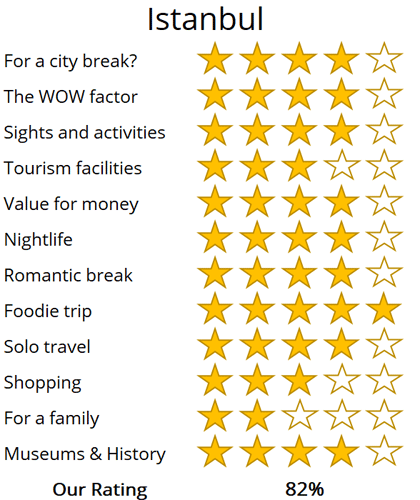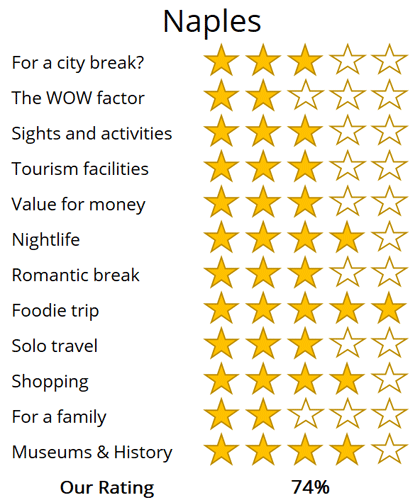WhereToGoForMyHoliday.com
The best destination comparison site!
WhereToGoForMyHoliday.com
The best destination comparison site!
Istanbul or Naples, which is better for your holiday in 2024?
Istanbul and Naples both offer unique and enticing experiences, but which one should you choose for your city break or holiday?
We understand your dilemma. There is an abundance of travel guides for both cities, but few actually comparing them, and advising you which is the better for your trip.
This article will provide our unbiased and independent views of Naples and Istanbul, hopefully making your choice that little easier.
The article is structured into several sections, each of which can be directly accessed through the following links:
• Introduction to the cities
• Scores and ratings
• Which one should I, friends, or family visit?
• When to visit and weather
• Who is the city suited for?
• The perfect 48hours (with map)
• Tourism details (where to stay? airport details?)
Introduction to Istanbul and Naples
Istanbul is one of the most captivating cities in the world, situated on the banks of the Bosphorus. It straddles Europe and Asia, offering a unique blend of East and West. The city's rich history is evident in its grandiose architecture, from the 6th-century Hagia Sophia to the 16th-century Topkapi Palace.
You can wander through ancient markets, explore the shadowy streets of the Ottoman Quarter, or relax in one of Istanbul's many parks. With its vibrant culture and stunning setting, Istanbul is a city that will stay with you long after you've left.

The Spaccanapoli cuts Naples in two and transitions from the old to modern sides of the city
In many ways, Naples is split in two halves; a town of shadow and light.
There's the Naples of pizza dough and La Dolce Vita, which is all about kicking it by the azure Tyrrhenian Sea with good food and great wine.
Then there's the gritty city, whose reputation comes from the Camorra mafiosos and the ramshackle alleys around Spaccanapoli street. Both are immersive and interesting in their own right
Put simply, Naples is one of the most authentic and enthralling cities in Italy. The self-proclaimed capital of the south, it's got Roman history and gorgeous landscapes in equal measure.
It promises something for honeymooners, backpackers, foodies, and outdoorsy types, but won't sugar-coat the experience with anything special for tourists.

The Blue Mosque in Istanbul

The harbour front in Naples
Istanbul vs Naples: City Ratings
Summary
Where would I journey for a personal escape?
Istanbul
Where would I send my parents for a memorable visit? Istanbul (via guided tour)
Where's the ideal destination for my adventurous 19-year-old cousin?
Istanbul
Where should my food-obsessed friend indulge their culinary passions?
Naples
Note: The above comparisons are weather-independent and are based on travel during the most opportune times of the year. Details about the ideal travel seasons are elaborated upon later in this article.
In the sections that follow, you'll find a comprehensive comparison between these two fascinating cities. This includes recommendations on the duration of stay, the best times to visit, and tailored 48-hour itineraries for each city.
The final segment delves into practicalities for your travels, such as the best airport to fly into, the optimal districts for your accommodation, and insider tips, for when you come to explore the city.
We hope that you find all of this information useful, in planning your next exciting trip!
Destination details
How long to spend each city?
That's a tricky one. Naples itself can be seen from tip to toe in just a couple of days. We'd say around 48 hours is perfect for tasting Neapolitan pizzas in legendary L'Antica Pizzeria da Michele and feeling the vibes down lively Spaccanapoli – the main drag in the historic centre.
For a longer stay of five to seven days, there's a catch: A lot of Naples's main draws are outside of town. Think the likes of Pompeii, the soaring crater of Vesuvius, and the Amalfi Coast. To add those on, you'll need to plan to come here for considerably more time.
Istanbul is a city that you could spend weeks exploring and still not see everything it has to offer. Three days is the best length, however, if you only have one day to spend in Istanbul, you can still see some of its most iconic sights, such as the Blue Mosque and the Grand Bazaar.
With two days in Istanbul, you could visit some of the city's most popular attractions, such as the Topkapi Palace and the Hagia Sophia. You can also take a cruise on the Bosporus Strait and explore the city's many markets and mosques.
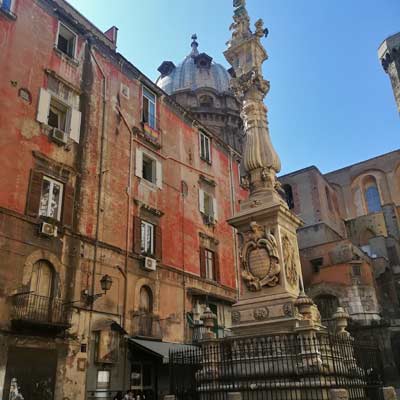
The obelisk of San Gennaro in the Piazza Riario Sforza
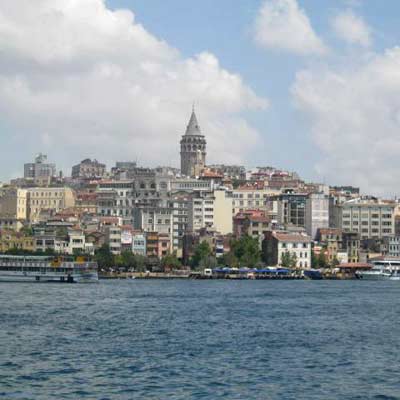
The Beyoglu district in Istanbul with the medieval Galata tower rising above this historic section of the city
Spring is the best time of year in Naples. This southern city gets warm nice and early, so you can expect April highs in the 20s and even enough sun to hit the beaches of Gaiola and the local lidos if you want to take a dip in the Med. There are fewer other travellers about before the summer rush too, which means you'll find it more pleasant strolling the historic centre and Pompeii.
Of course, that's not to say the summer is bad in these parts. It most certainly isn't. Reliable warmth and loads of sunshine, topped off with a buzz about town, help make the months between June and August great options. Just be prepared to pay extra for hotels and flights, and don't expect the city to be quiet.
When things get hot in Istanbul, things get really hot. In fact, it's not uncommon for summertime temperatures to creep over 30 degrees. What's more, June to August is when the crowds come, packing out sights like the Grand Bazaar.
The upshot here is that spring and fall reign as the top times in the calendar to plan a visit. March, April, September and October tend to be cooler, less busy and less expensive.
Winter can bring snows. Photographers will adore the city when it's blanketed, as the Hagia Sofia and the Blue Mosque look simply stunning under a sheen of the white stuff. However, the months from November to February can be bitterly cold, so off-season visitors will need to wrap up warm and forget having al fresco Turkish coffees on the street side.
Naples is a raw and immersive Italian city. It's got pizza places that are frequented by locals. It's got wine bars serving gorgeous Campanian tipples. It's lived-in and gritty and real. That makes it perfect for city hoppers who like atmosphere and energy. And the joys don't end there…
Just around the Bay of Naples are two of the country's most impressive archaeological sites: Pompeii and Herculaneum. They'll entertain the history lovers, along with the likes of the Castel dell'Ovo and the vast Museo Archeologico Nazionale. Loved-up duos might also want to make Naples a pitstop on a couple's break to the impossibly gorgeous Amalfi Coast that lies to the south.
Naples isn't for those who like small, easy-going towns where there's lots of room. It's crammed between the volcanos and the sea, so things are compact in the centre. It can also be quite hectic, with touts and traffic.
Istanbul presents itself as an adventurous and unconventional getaway for European travellers, standing in stark contrast to the typical package holiday with pre-arranged accommodation by the sea.
Here, visitors are immersed in captivating Ottoman history and bustling bazaars, encouraging them to step out of their comfort zones and expand their horizons.
However, those seeking a compact, easily navigable city may find Istanbul overwhelming. Home to 15.5 million residents and spanning two continents, Istanbul is vast and sprawling, far from a small-scale destination.
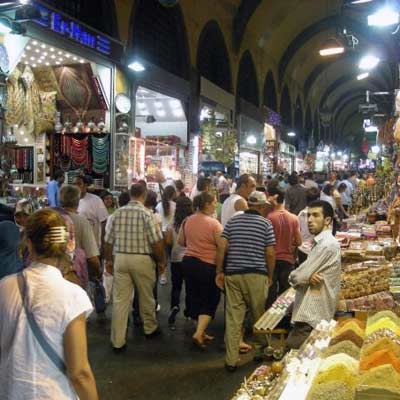
The lively and chaotic Grand Bazaar in Istanbul
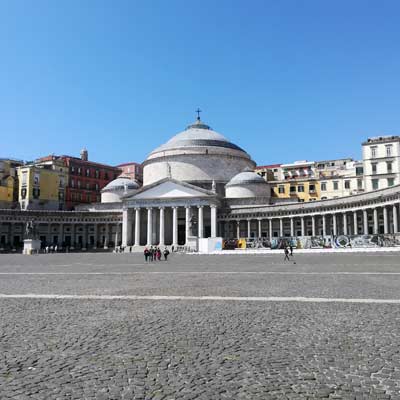
The Piazza Plebiscito is the grand square of Naples
Everything from millennia-old villas to rich art collections is on offer in this 48-hour guide to Naples. Oh, and there are plenty of chances to devour pizza – it's considered the very best in Italy.
Day 1: Start in the Quartieri Spagnoli. Ramshackle and rough around the edges, it's the perfect combo of Neapolitan grit and charm. There's bound to be a cafeteria serving cannoli (crunchy Sicilian pastries) and cappuccino there that takes your fancy.
You'll need the energy, because your next destination is the acclaimed Naples National Archaeological Museum. It's known to have one of the largest collections of Roman artifacts anywhere in the world, but the standout highlight is surely the Alexander Mosaic, reconstructed from the floors of Pompeii's opulent House of the Faun.
Once you're done in there, head south to the sleepless street of Spaccanapoli. Literally meaning 'the street that divides Naples', it does exactly as that implies. It runs right through the heart of the city, with drooping washing lines, street-food vendors and age-old churches looming on both sides. It will take a while to walk its two kilometres but it's all about breathing in the urban energy. What's more, the iconic L'Antica Pizzeria da Michele sits at the eastern end.
You'll be rewarded there by one of the best pizzas in town – choose between marinara (just fresh tomato passata and garlic) and bufalina (with buffalo mozzarella). After lunch, make for the port area.
That's crowned by the turrets of the Castel Nuovo, a grand fortification that has a history of more than 800 years. Behind that comes vast Piazza del Plebiscito. Prepare to be stunned by its sheer size and grand horse statues. For evening, a few cocktails and some tasty homecooked pasta awaits in the osterias of stylish Chiaia district.
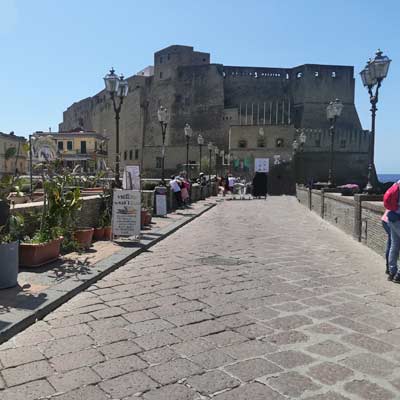
The Castel dell'Ovo (Egg castle) on the harbour front of Naples
Day 2: Rise early and get to the platforms of Naples Centrale station. That's where the trains depart for Pompeii in the morning. You might just have heard of that place – it was once an entire Roman resort town for the nobles and elite of the empire.
That is, until Mount Vesuvius suddenly erupted in 79 AD and flooded it with lava and ash. These days, the site is an amazing and haunting archaeological dig, with whole streets, entire villas, and even brothels complete with Roman wall art just waiting to be discovered.
It's likely Pompeii will take more than half of the day, while the most devoted history buffs can add on a trip to Herculaneum to boot. If not, head back to Naples city and go straight to the hilltops where the Castle of St Elmo keeps watch. That's the Vomero district, and it's famed for its sweeping panoramas of the Gulf of Naples and Mount Vesuvius. With that as the backdrop, find yourself a traditional trattoria or pizzeria and dine with a view of the metropolis to cap off the trip.

Pompeii was covered in 6m of volcanic ash when Mount Vesuvius erupted in AD 79
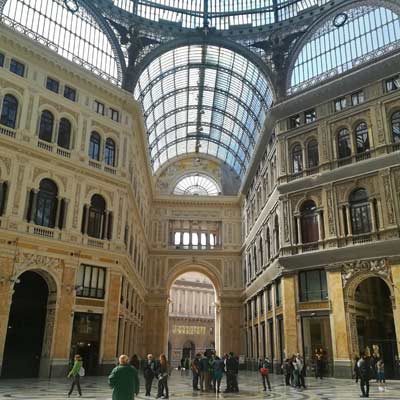
The elegant Galleria Umberto I shopping gallery in Naples
You can unearth some seriously jaw-dropping sights, taste some unforgettable food, and get a grounding in Turkish history with only 48 hours to spend in Istanbul.
Day 1: The perfect starting point is Sultanahmet, epitomizing the iconic imagery of Istanbul with its minarets and grand mosque domes. Dominating the skyline is the colossal Hagia Sophia, a historic gem with over 1,500 years of history, transitioning from an Orthodox cathedral to a mosque, and now a museum. Inside, visitors are captivated by exquisite mosaics and frescoes, with the dome, boasting a remarkable 30-metre diameter, being the centerpiece.
Directly to the south sits the majestic Blue Mosque, constructed in the early 1600s and still in use today. A short walk northwards takes you to the Topkapi Palace Museum, once the residence of Ottoman sultans, now a UNESCO World Heritage site commanding a magnificent view over the Bosphorus.
Ensure you make a stop at Tarihi Sultanahmet Kofta House, renowned since the 1920s for its traditional Turkish meatballs.
From there, it's not far to the Grand Bazaar. One of the world's largest markets, it's a haven for haggling and souvenir shopping, where lantern sellers converge on sari stalls and shisha houses.
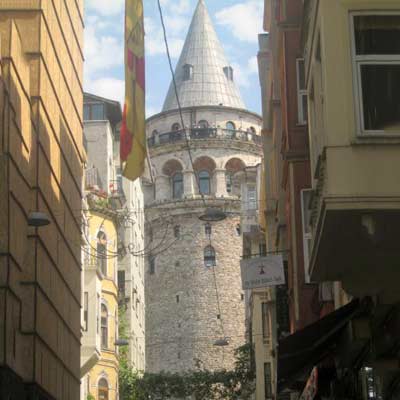
Galata tower is at the heart of the Beyoglu district
Day 2: Big, modern Taksim Square starts day two with a sighting of what 21st-century Istanbul is all about. Be sure to take a glimpse of the honorific statue at its heart.
That's the Republic Monument, made to celebrate the foundation of the Turkish state in 1928. Nearby Istiklal Street has abundant choices on the food front, no matter if you're craving a gritty Turkish coffee or a regional breakfast spread of mezze cheeses, flatbreads, and olives.
It's also a busting artery of the city, with high-street shopping and a classic trolley car running its length. One thing you can't miss – literally! – here is Galata Tower. Built by the Genoese to protect their European strongholds from the east, it's a mind-blowing fortification that boasts sweeping panoramas from its top floors.
Your afternoon session should be dedicated to exploring the Bosphorus. There's really no better way to do that than on a boat. Some cruises even offer stops in Asian Istanbul and meals with the sunset to boot.
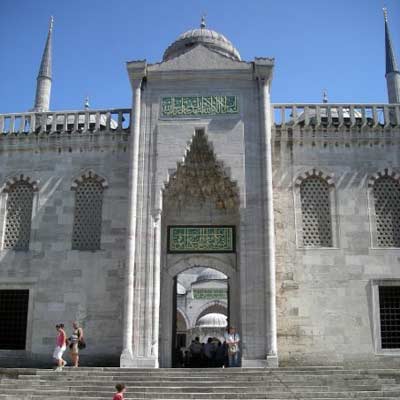
The entrance to the Blue Mosque
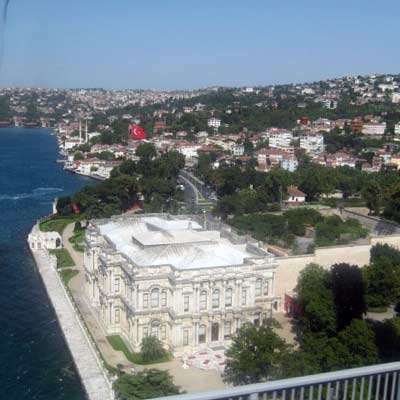
The Beylerbeyi Palace was the summer residence of the Sultan
Capodichino Airport, or Naples Airport, is the main gateway to the city by air. It's the fifth largest in the country, so should have lots of low-cost and premium services jetting into its runways. There's a metro line to the terminal in the works, but for now arrivals will need to use the Alibus to Naples Centrale station. Tickets cost about €5 each way and the travel time is roughly 15 minutes outside of rush hours.
Centrale Station is a main stop on the north-south railway line through Italy. It's easy to get there on high-speed links from Rome and even Milan. That's one of the most glamourous ways to arrive in Campania, offering gorgeous views of the countryside before pulling right into the heart of the city.
When it comes to booking hotels in Naples, take some time to consider each neighbourhood one by one. Most travellers are drawn to the Historic Centre (or Centro Storico in local speak). That's the home of the Duomo and the buzzing lane of Spaccanapoli.
It's probably one of the pricier and more lively areas to stay. Alternatively, go to Vomero for boutique B&Bs with great views, not to mention proximity to some of the coolest hipster eateries and cafes. Or, choose the down-to-earth Quartieri Spagnoli, which is filled with hostels and guesthouses that shouldn't break the bank.
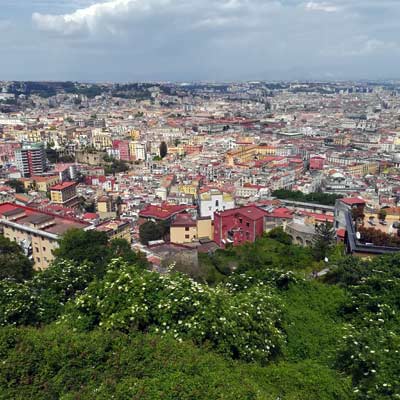
The view over Naples from the surrounding hills
Naples has a reputation for being Italy's roughest and most dangerous place.
It's true that crime rates are higher here than in the north. What's more, the mafia are still in action in these parts. You'll want to be a little more careful walking around areas like the Naples Centrale station and Quartieri Spagnoli.
Also try to stick to more touristy central districts, and don't walk alone at night. On top of that, be wary of street touts selling stolen goods, and be on the guard for pickpockets and drive-by thieves on scooters.
The modern Istanbul New Airport is the main hub serving this big city. It handles the largest amount of air traffic in Turkey, so expect to find lots of connections in from Western Europe and beyond. Regular shuttle buses link the terminals with the downtown in around 50 minutes to one hour, but, be warned, travel times can vary greatly depending on traffic. The smaller Sabiha Gokcen International Airport hosts most of the services coming in from across the Middle East. It's over on the south side of the metropolis.
Public transit in Istanbul is just what you might expect from a vast, consistently expanding megacity. The best way to go about getting from A to B is to bag yourself an Istanbulkart. It's an all-in-one pass to the town's multi-faceted transport networks, allowing holders to use buses, trams, trains, metros, and even a few of the ferries. You'll need to buy your card from a kiosk and then top it up with credit to make journeys.
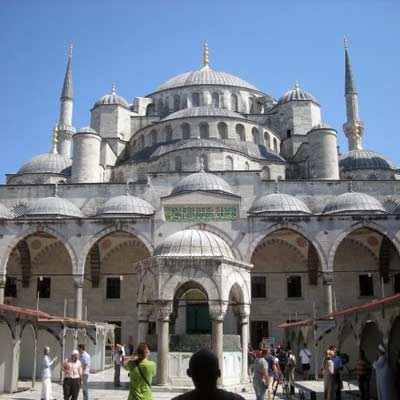
The Sultan Ahmed Mosque
Istanbul's tourist areas suffer from the same scams as many other European cities. Fake guides, pickpockets and unregistered taxis are particularly common, so be sure to have your wits about you when sightseeing. Be wary when converting cash in the Old Town area too, because extortionate commission rates and even fake banknotes have been reported.
Choosing a hotel in Istanbul really depends on what you want. Sightseeing in Sultanahmet is what most people come for and there are loads of hotels to pick there, even if paying a premium is normal. Beyoglu is better if you're after chain hotels and boutique stays, and it's right on the more modern and happening part of town. Asian Istanbul will likely be cheaper, but also a ferry ride from the most famous attractions.
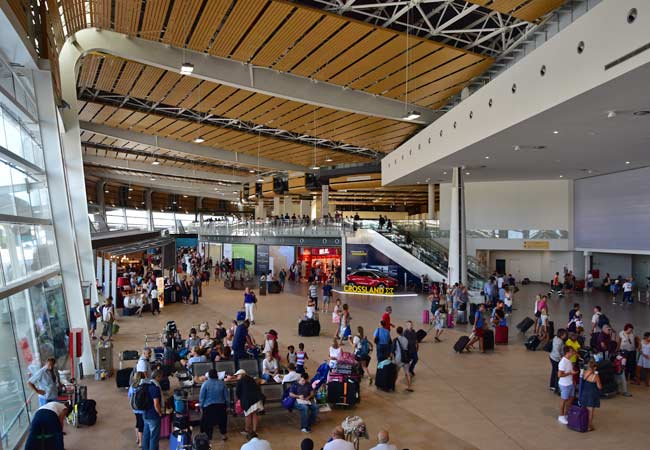
oh we were stuck in the airport!

Copenhagen was a bit expensive...

All we did was drink beer in Brussels...
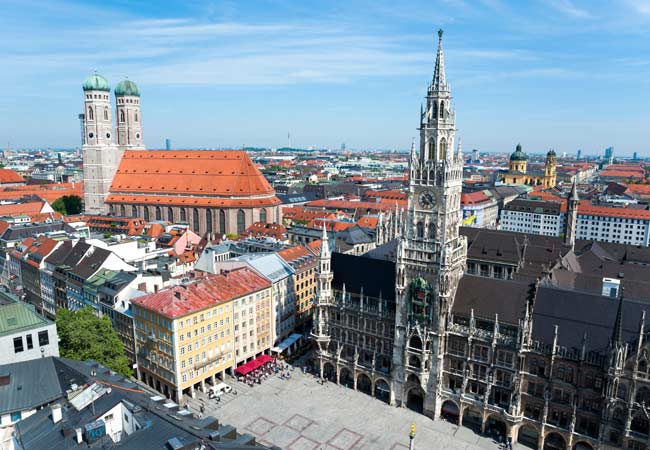
Muncih was crazy
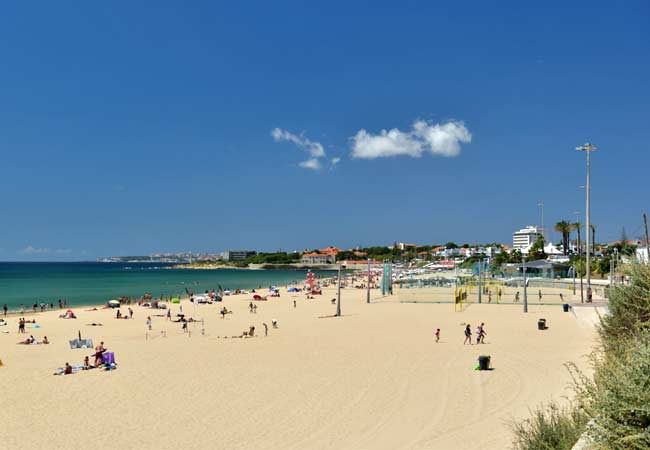
And we got so burnt!
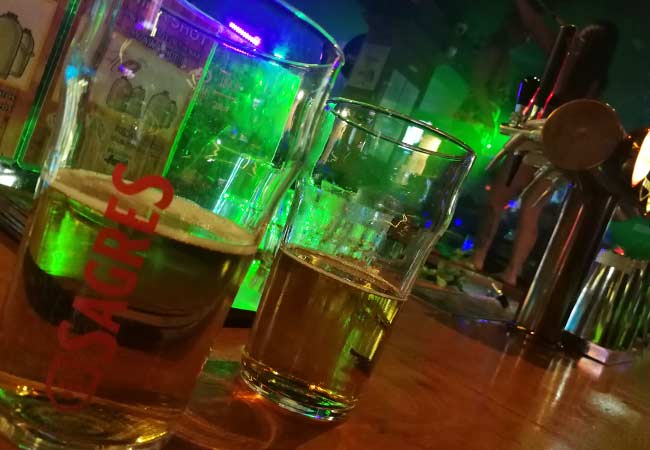
Remeber that night in Rome

oh we were stuck in the airport
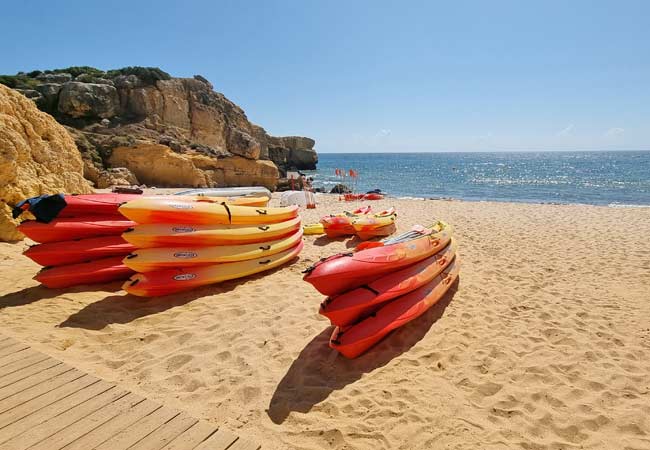
So much fun kayaking

Berlin and that group from Austria!

There was such a view from that church

And we got so burnt!

Munich was eventful, wasn't it!

Such a view from that cathedral in Florence
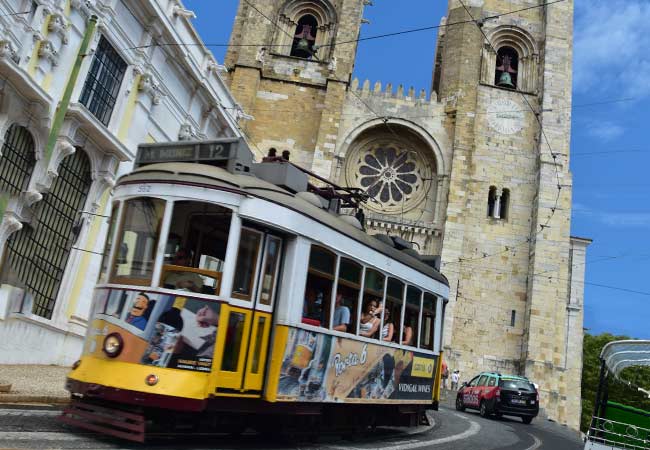
Lisbon was such so much fun

Last summer was so much fun .... x

Remeber that night in Rome

Lisbon was such so much fun

Such a view from that cathedral in Florence

Munich was eventful, wasn't it!

And we got so burnt!

Remeber that night in Rome

All we did was drink beer in Brussels...

Berlin and that group from Austria!

Can't wait to go back to Dubrovnik

Remember that boat ride in Prague

Copenhagen was a bit expensive...
